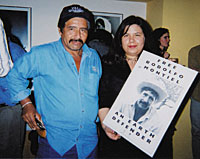|
By Zach Roth and Sam Parry
 From prison in Mexico, bean-farmer-turned-Goldman-Prize-winner Rodolfo Montiel persisted with his work to protect forests in his native state of Guerrero. He used the few phone calls he was allowed to speak with supporters and tell his story to American news outlets. From prison in Mexico, bean-farmer-turned-Goldman-Prize-winner Rodolfo Montiel persisted with his work to protect forests in his native state of Guerrero. He used the few phone calls he was allowed to speak with supporters and tell his story to American news outlets.
Released last fall after 30 months in jail, Montiel is carrying on the fight. He toured four U.S. cities in March to highlight his ongoing struggle to stop illegal logging in Mexico and the intimidation and violence used by powerful interests in Mexico to silence activists.
Montiel's tour was part of the Sierra Club's campaign linking environmental advocacy and human rights violations. The Club also sponsored a March speaking tour by Ken Wiwa, eldest son of slain Nigerian activist and playwright Ken Saro-Wiwa.
For Montiel's work organizing his neighbors and co-workers against rampant logging by an American company, he was beaten, arrested and jailed. On his speaking tour, he recounted how his military captors tortured him by bending his back out of shape and attaching electrodes to his testicles.
Though Mexican President Vicente Fox released Montiel and fellow activist Teodoro Cabrera in November, the government never declared them innocent of the false charges against them.
Montiel said he still fears for his safety. A month before his release, Digna Ochoa, a prominent human-rights lawyer who was defending Montiel, was murdered in her Mexico City office. Neither Montiel's torturers nor Ochoa's murderers have been brought to justice.
For Montiel, the U.S. trip was also a chance to thank the Sierra Club and Amnesty International USA for their work in pressuring the Fox administration to free Cabrera and him.
The Sierra Club and Amnesty organized letter-writing campaigns, rallies, city council resolutions, visits to newspaper editorial boards and an in-prison presentation of the Goldman award in support of their release.
In the mid-1990s, the Sierra Club and other human rights groups intervened in support of Nigerian playwright and activist Ken Saro-Wiwa, who fought to hold Shell Oil accountable for the environmental degradation of his Ogoni homeland. But Nigeria's military rulers charged him with murder and executed him in 1995.
Speaking in Missoula and Bozeman, Mont., and Sheridan and Laramie, Wyo., Ken Wiwa described his father's struggles and the many challenges communities around the world face in the era of economic globalization.
"My father's struggle is a universal struggle for justice and fairness," said Wiwa. "The more power companies like Shell develop in Nigeria, the more influence they can exert on governments around the world."
In a region of the United States where resource extraction accounts for much of the local economy, Wiwa's message of holding multinational oil companies accountable resonated. Sierra Club President Jennifer Ferenstein, who introduced Wiwa in Missoula, began by expressing outrage about the Senate's vote rejecting higher fuel economy standards for cars.
"This vote means we will continue to rely on oil from places like the Niger Delta, where human rights and environmental problems persist," she said.
Local Club organizers Janet Maxwell, Mary Anne Peine, Bob Clarke, Liz Howell, Pam Coles, Katie Craig and Drusha Mayhue helped organize Wiwa's tour.
Wiwa encouraged activists to get involved in the Sierra Club's International Right to Know initiative, which would establish disclosure standards for U.S. companies operating overseas. "This is one way to hold companies accountable for their activities," Wiwa said.
The Wiwa family recently won a victory in U.S. federal court when a New York City judge ruled that a trial charging Shell with complicity in Saro-Wiwa's execution could proceed.
Wiwa recently wrote "In the Shadow of a Saint," a book about searching for answers in the wake of his father's execution.
"There are people who want to make the world safe for their children, others who want to make their child safe in the world. My father was in the first camp," said Wiwa.
Rodolfo Montiel is also in that camp. During the tour, he smiled when he talked about his 11-year-old daughter, who has inherited her father's love of the earth and cajoles her classmates into picking up litter from the streets of their town. But Montiel knows, like Wiwa, that there's much to do before the next generation of environmental heroes is free to follow in their fathers' footsteps.
For more information on the Sierra Club's International Right to Know campaign, contact Sam Parry at sam.parry@sierraclub.org.
Up to Top
|